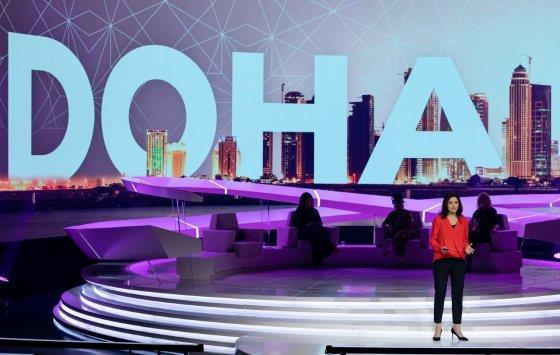
Doha Debates finds its strength in solidarity, voicing thoughts on pressing global issues
Doha: Qatar Foundation's (QF) Doha Debates was founded on the belief that we don't have to settle for a divided world. Amid the global crisis caused by the novel coronavirus (COVID-19), the community is finding strength in solidarity — and, of course, most are working from home, washing hands frequently and practising social distancing, even as everyone continue forward.
'But this doesn't mean we've stopped bringing people together. On March 9 and 11, we held our final two debates of the first season, which we did without the usual live audience. We used videoconferencing, Instagram videos and Twitter to preserve the interaction and liveliness of the debates, Amjad Atallah, Managing Director, Doha Debates, has said in a letter to the community.
The first debate brought together three women from around the world, along with moderator Ghida Fakhry to discuss whether quotas could hasten gender equality. And just two days later, Doha Debates hosted three experts to discuss the future of genetics and whether should create superhumans.
The question of where the line should be drawn in human gene editing, and if it should be allowed to create superhumans, has been tackled by Doha Debates in the final debate of the Qatar Foundation production's first season under its new concept.
Three experts participated in an intense discussion on the ethics and challenges of human genetic enhancement during the debate at Northwestern University in Qatar, which, due to the global coronavirus pandemic, was held without its usual live student audience.
The debate primarily focused on germline editing, which results in heritable changes to DNA — meaning that, if embryonic DNA was edited to produce blue eyes, the genes for blue eyes would be present in a person's children, and their children's children and has earned the world's attention and criticism in recent years. Moderator Ghida Fakhry framed the debate by asking whether the aim of gene editing should be to edit out certain debilitating diseases or conditions, and if it will increase global inequality if it is initially only available to those who can afford it.
'We invite you to watch the full debates — not only will they be a welcome distraction if you are social distancing, you'll learn about some of the world's other pressing issues and how to solve them. If you're a teacher or parent, we have lesson plans based on earlier debates, on artificial intelligence and the global refugee crisis that you can download and use right now, Atallah has said.
'It's always been important for us to focus on constructive conversations, and now more than ever we must come together to forge solutions out of disparate points of view, he added.
In this backdrop, Doha Debates launched Course Correction as part of a revamped concept, which includes a live event debate series, digital videos, blogs, and a portal facilitating live video conversations on key global topics with people around the world. To view the podcast, visit www.dohadebates.com/listen
Issues surrounding the impact of the global coronavirus pandemic on the world, the consequences of decisions being made now, and how it could change the world have been discussed in the latest edition of Doha Debates' Course Correction podcast series.
Course Correction has been developed by the Qatar Foundation production to unpick key global issues through the eyes of experts and thought-leaders who aim to make a difference. In a special coronavirus-focused episode, host Nelufar Hedayat gauged the views of Parag Khanna, a leading global strategy advisor who specialises in international relations, and Dr. Jason Hickel, Economic Anthropologist at the University of London.
If missed the discussion on ‘COVID-19 Will Change the World Forever' interested audience can listen to it on the Doha Debates website.
'As we all adapt to the realities of the novel coronavirus outbreak, our thoughts are with the people who have contracted COVID-19 as well as the people working so hard to fight it, said Atallah.
'We at Doha Debates are already talking about new ways to stay interactive and engaging during this crisis, so please stay in touch on social media and check for new developments at DohaDebates.com as we navigate this new urgent global issue. Meanwhile, stay safe, follow protocols from your country's health organisations and stay firm in our shared belief that together, we can find solutions, he added.
The Doha Debates was relaunched in December 2018, and it builds on the tradition of examining complex global issues, established by Doha Debates' original launch 14 years ago, through live debates, digital videos, a TV series, blogs and podcasts on the world's most pressing challenges. This innovative approach included Majlis-style conversations designed to bridge differences, build consensus and identify solutions to urgent global issues.
Aligning with the objectives of QF's educational mission, Season 1 of Doha Debates included digital conversations and live debates held at Northwestern University in Qatar, a QF partner university, at Education City in Doha, and international cities.
The live events were moderated by Ghida Fakhry, an award-winning multilingual journalist and TV host. The events livestreamed across digital channels.
Doha Debates was never just a talk show. It's a showcase for all the passions and dramatic confrontations of the Middle East and the world. Instead of just debating problems, Doha Debates will engage millions of young people to find individual solutions, not in a gladiator-style winner-takes-all shouting match to score political points, but in invigorating and creative formats across a multitude of platforms.

Legal Disclaimer:
MENAFN provides the
information “as is” without warranty of any kind. We do not accept
any responsibility or liability for the accuracy, content, images,
videos, licenses, completeness, legality, or reliability of the information
contained in this article. If you have any complaints or copyright
issues related to this article, kindly contact the provider above.


















Comments
No comment